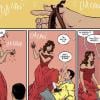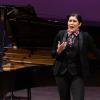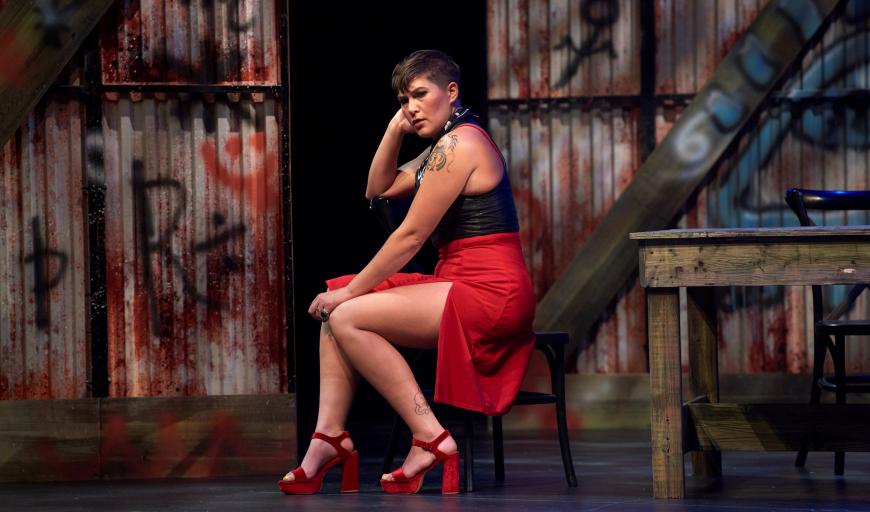
Any production of Carmen hangs success on casting the title role. Restless and fiery, the character of Carmen stokes the tragedy at every turn, embroiled in — or rather, initiating and constantly stirring — the stormy relationship with José that leads to her death. And this being an opera, all the hurricane of her being swirls through the wonderful and justly famous songs that Georges Bizet wrote for her.
Festival Opera’s production, playing twice last weekend at the Lesher Center for the Arts in Walnut Creek, got it right, even though the fine mezzo-soprano Taylor Raven (Charmian in last year’s Antony and Cleopatra at San Francisco Opera) had to bow out near the last minute. In her place, Carmen was sung by Nikola Printz, debuting with Festival Opera and delivering a gripping performance both musically and dramatically. Printz (who uses they/them pronouns) has a rich, dark, and focused mezzo that carried the power of Carmen’s passion across the orchestra pit and into the heart. Their voice moves nimbly between moods — anger giving way to vulnerability, lyricism veering suddenly into mockery.
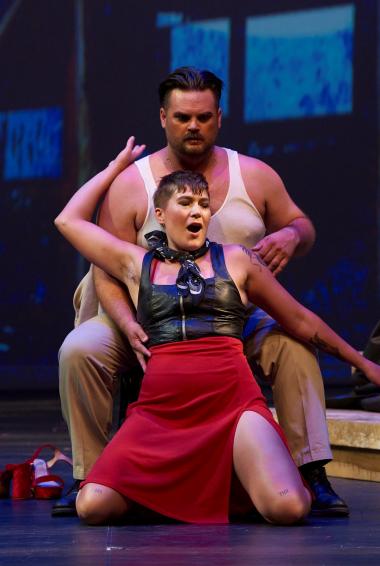
Athletic and balletic, Printz brought to the role an accomplished language of strong and immediately readable dramatic gesture. Their Carmen was by turns pushed and badgered, caressed and taunted. Even in the crowd scenes, there was no way one could lose track of the heroine, pacing about the stage like a hungry lioness.
Of course, the tragedy is not Carmen’s alone, as her lover makes his own fatal plunge into jealousy and murder. As José, tenor Dane Suarez matched Printz’s vocal power with his intense and expressive singing, reveling in lyrical moments of love as well as opening his soul in compelling outbursts of anger. His aria in Act 2, “La fleur que tu m’avais jetée” (The flower you threw at me), movingly captured José’s painful obsession with Printz’s Carmen, who played him like a fish on the hook.
Their relationship becomes a violent one, progressing from seduction into emotional pain and ending in brutal assault. Festival Opera’s production, directed by Michael Mohammed, did not stint on the violence — going so far as to stage Carmen’s death with physical, hands-on strangling in place of the usually less protracted stabbing called for in the libretto. But there were moments of tenderness as well, bringing out the vulnerability in both of these powerful characters.
Micaëla, José’s hometown sweetheart, was sung by soprano Hope Briggs with a radiance that alternated with lightning flashes of determination. Baritone Young Kwang Yoo brought a proud suavity to the role of Escamillo, the toreador for whom Carmen ditches José. Carmen’s two companions, Frasquita (Lila Khazoum) and Mercédès (Lily Bogas), sparkled in several lighter interludes to the action, matched with fine performances by smugglers Le Remendado (Taylor Thompson) and Le Dancaïre (Daniel Cilli). Matthew Lovell gave a hint of dignity to Zuniga, the hapless officer infatuated with Carmen.
The opera was set in modern times, in something like the streets of Oakland, with graffiti in ample supply. It was a welcome change from the usual faux-Spanish decor. Costume designer Joy Graham-Korst fashioned a series of eye-catching modernist outfits for Carmen, from cutoffs in Act 1 to street-tough leather and finally a gleaming sharkskin suit over a bejeweled red bra.
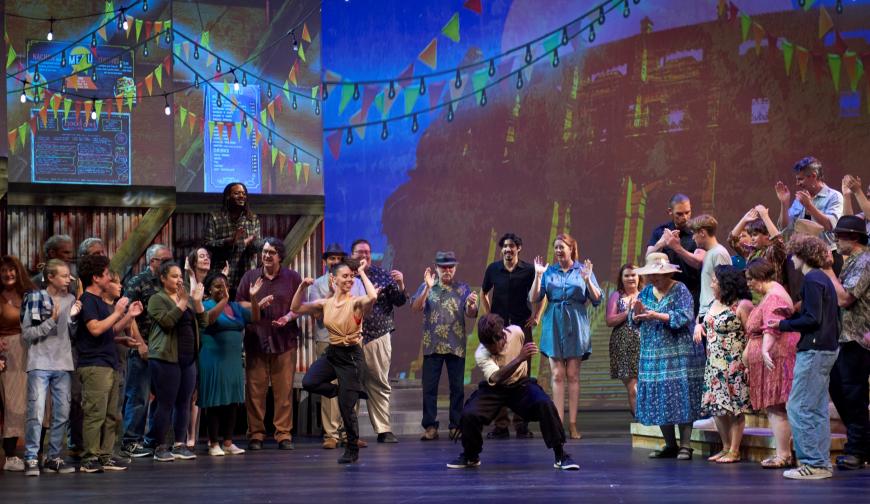
The orchestra, led by Festival Opera regular Robert Mollicone, deftly supported all the action, enriching the vocal drama with the rich coloration of Bizet’s score. The splendid chorus, prepared by Bruce Olstad, mastered the fast-moving French and responded nimbly to Bizet’s demands for on-the-button interjections. The children’s chorus, sung by members of Pacific Boychoir Academy, sparkled with good diction and age-appropriate street games. Two splendid local dancers (Stuck Sanders and Anthéa Colot) added energy and grace to the crowd scenes with freestyle improvisations.
On opening night, the supertitles were seriously miscued, confusing much of the audience. Again and again, one character’s sentiments were imposed on what another character was singing, and whole sections of dialogue were accompanied by a blank screen. Hopefully this was remedied for Sunday’s matinee. Along that line, a suggestion: Would it not make sense for productions to switch to English for the long sections of spoken dialogue? The French would well be saved for the sung portions.
Festival Opera and its hardworking general director, Zachary Gordin, are to be heartily commended for putting on a great show once again. The only downside is that they mount just the one opera a year — and that only for two performances. Maybe if the arts were funded the way they should be ... ?



